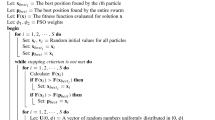Abstract
This chapter will focus on the development of a system with Artificial Intelligence based on Evolutionary Computation that allow generate a quasi-optimum trace of a pipeline integrating Digital Elevation Models and Geographical Information Systems. The algorithm is conceived with optimization purposes based on the relevant characteristics of the trace without prior monetary quantification, although the last was taken into consideration.
The chapter will consist of three main sections: the description of the baseline information, a description of the design of evolutionary algorithm (EA) handling information of the first stage and finally the tasks of adjusting the parameters of EA and obtaining pipeline route quasi-optimum in the case of interest.
The tool developed in this chapter allows obtaining a quasi-optimal route trace by using a hybrid evolutionary algorithm. This development that exploits modern technologies opens new perspectives for feasibility studies of paths, reducing the total costs.
Access this chapter
Tax calculation will be finalised at checkout
Purchases are for personal use only
Preview
Unable to display preview. Download preview PDF.
Similar content being viewed by others
References
Bäck, T:, Evolutionary Algorithms in Theory and Practice. Oxford University Press (1996)
Darwin, C.: On the Origin of Species by means of Natural Selection, or the Preservation of Favoured Races in the Struggle for Life, England (1859), http://www.bbc.co.uk/education/darwin/origin
Núñez Mc Leod, J.E., Rivera, S.S.: Extracción de Bordes con un Algoritmo Genético Restringido por Texture. In: SVMNI, Simulación con Métodos Numéricos: Nuevas Tendencias y Aplicaciones. Int. Conf. Proc., pp. BI17–BI24 (1998)
Núñez Mc Leod, J.E., Rivera, S.S.: Algoritmos Genéticos aplicados a la Segmentación de Imágenes y Reconocimiento de Formas. In: AMCA, Mecánica Computacional. Conf. Proc., p. 79 (1999)
Núñez Mc Leod, J.E., Selección: Óptima de Componentes de un Sistema Tecnológico Complejo. SVMNI, Métodos Numéricos en Ingeniería y Ciencias Aplicada.Int. Conf. Proc., pp. OP41–OP46 (2000)
Núñez Mc Leod, J.E., Barón, J.: Risk Optimization on CAREM 25 Nuclear Power Plant. In: Balkema, Safety and Reliability. Int. Conf. Proc. (2003)
Siegal, B., Gillespie, A.: Remote Sensing in Geology. John Wiley & Son (1980)
Childs, J.: Extracting DEMs from Topographic Maps (2001), http://data.geocomm.com/dem/ (accessed November 02, 2010)
Burrough, P.A.: Principles of geographical information systems for land resources assessment. Clarendon Press, USA (1986)
Goldberg, D.: Genetic Algorithms in Search. In: Optimization & Machine Learning. Addison-Wesley, Reading (1989)
Barón, J., Núñez Mc Leod, J.E., Rivera, S.S.: Muestreo Montecarlo e Hipercubo Latino versus Hipercubo Latino Escalable. España. Métodos Numéricos en Ingeniería. SEMNI, 63 (1999)
Núñez Mc Leod, J.E., Rivera, S.S., Núñez Mc Leod, J., Euillades, L.: Estudio de Poblaciones Iniciales para un Algoritmo Genético Híbrido aplicado a la Optimización de Trazados. In: Rojo, J., Torres, M., Cerrolaza, M. (eds.) Simulación Numérica y Modelado Computacional, Venezuela, pp. op19–op26 (2004)
Goldberg, D.: Genetic Algorithms in Search, Optimization & Machine Learning. Addison-Wesley (1989)
Hocaoglu, C., Sanderson, A.: Planning Multiple Paths with Evolutionary Speciation. IEEE Transactions on Evolutionary Computation 3(5), 169–191 (2001)
Smierzchalski, R., Michalewicz, Z.: Modeling of Ship Trajectory in Collision Situations by an Evolutionary Algorithm. IEEE Transactions on Evolutionary Computation 3(4), 227–241 (2000)
Coello, C., Van Veldhuizen, D., Lamont, G.: Evolutionary Algorithms for Solving Multi-Objetive Problems. Kluwers Academis Publihsers (2002)
Author information
Authors and Affiliations
Editor information
Editors and Affiliations
Rights and permissions
Copyright information
© 2013 Springer-Verlag Berlin Heidelberg
About this chapter
Cite this chapter
Núñez Mc Leod, J.E., Rivera, S.S. (2013). Pipeline Trace Quasi-optimum Determination. In: Zelinka, I., Snášel, V., Abraham, A. (eds) Handbook of Optimization. Intelligent Systems Reference Library, vol 38. Springer, Berlin, Heidelberg. https://doi.org/10.1007/978-3-642-30504-7_27
Download citation
DOI: https://doi.org/10.1007/978-3-642-30504-7_27
Publisher Name: Springer, Berlin, Heidelberg
Print ISBN: 978-3-642-30503-0
Online ISBN: 978-3-642-30504-7
eBook Packages: EngineeringEngineering (R0)




